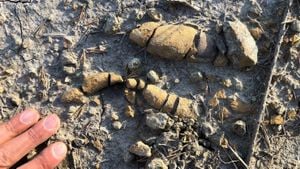Hurricane Milton, which recently swept across Florida, left communities grappling with devastation as they put their lives back together. This catastrophic storm made landfall as a Category 3 hurricane on October 9, unleashing maximum winds of 100 mph, hence triggering multiple tornadoes throughout its path. Although the overall losses from the disaster are still being counted, preliminary reports indicate extensive damage, particularly east-central and northeastern Florida. Official data estimates over 100 homes were completely destroyed, and more than 3 million residents lost power during the storm's rampage.
While the precise death toll of Hurricane Milton remains undisclosed, St. Lucie County Sheriff Keith Pearson warned, “We have lost some life,” indicating the storm's severe impact on human lives. The hurricane, following its destructive path, quickly moved back over the Atlantic Ocean, leaving various authorities, health organizations, and rescue teams to survey the extensive damage on the ground.
Immediate recovery initiatives began to shape up as residents and local charities stepped up to offer assistance. Organizations like Feeding Tampa Bay and Metro Ministries quickly mobilized resources to provide food and shelter to those affected. Hundreds of volunteers rallied, showing up to provide meals and support to families grappling with uncertainty. Metro Ministries, as one of the frontline responders, helped secure housing and distributed emergency supplies like food and water to those desperately needing help.
So, how can residents contribute? Donations to the Florida Disaster Fund can make a significant impact by channeling resources to service organizations working directly with individuals facing losses. Local charities and national organizations such as the American Red Cross, Mercy Chefs, and the Salvation Army also actively distribute meals, emotional support, and long-term recovery services for those impacted by the storm.
Outside immediate aid, the legal aspects of recovery pose challenges for many residents. Following the storm, the Bay Area Legal Services witnessed an influx of victims seeking assistance for various legal issues exacerbated by the hurricane's fallout. The Florida Disaster Legal Aid Helpline became instrumental for those grappling with eviction notices, insurance claims, and contractor disputes. With the helpline fielding approximately 80 calls per day post-storm, the urgency for legal guidance is palpable.
Managing attorney Jason Susalla noted the dramatic increase—the helpline recorded only several calls daily before Hurricane Milton but soared as FEMA circulated the helpline’s number through disaster recovery centers. This uptick indicates the complex intertwining of disaster response and the legal system, which often feels overwhelming for residents trying to stabilize their lives amid calamity.
Bay Area Legal Services recently received a $25,000 grant from the Community Foundation Tampa Bay, aimed at addressing the growing caseload. This funding allowed the nonprofit to hire additional personnel to manage the surge, offering timely support and guidance during this tumultuous time.
The significance of these services cannot be overstated. They work not just toward immediate recovery but aim to rectify systemic issues faced by disaster victims, ensuring access to justice for vulnerable communities. Amidst the heartbreak, community organizations strive to restore some semblance of normalcy, reinforcing individuals’ rights and providing the necessary resources to rebuild their lives.
Yet, it’s not just individuals feeling the heat from Hurricane Milton; local businesses are grappling with the aftermath as well. The real estate market on the Treasure Coast is showing signs of stress following the hurricane’s impact. Reports indicate fewer homes sold across Martin, St. Lucie, and Indian River counties during October, correlationally tracing back to Hurricane Milton’s wrath. The median sale prices, nevertheless, saw nominal increases, indicating market fluctuations.
David Serle, the president of Broward, Palm Beaches & St. Lucie Realtors, observed, “Inventory has certainly increased. The real estate market is approaching a balanced market, and prices continue to level out.” He maintains optimism, expecting the market to bounce back as sale closings likely surge. We may witness rising demand for homes, particularly as displaced families seek new living arrangements.
Despite the immediate chaos, the undercurrent of hope runs strong through the various relief efforts across the affected regions. Community spirit shines bright as residents come together to support one another, whether it’s through donated labor or financial contributions. Recovery may be slow, but with neighborly generosity and governmental support, there’s belief among the residents of Florida's recovery capability. Local stories of resilience encapsulate the community’s fighting spirit—backing one another through the darkest times.
On the ground, amid the physical ruin, there is much work yet to be done. Farmers, too, are feeling the repercussions as agriculture was heavily impacted by Hurricane Milton, Helene, and Debby. To assist farmers, the State of Florida, USDA, and FEMA are joining forces to establish one-day Farm Recovery Centers across Hamilton, Lafayette, and Suwannee counties. These centers aim to provide not just immediate support but also long-term assistance to rebuild lost crops and restore agricultural viability.
The silver lining lies in community fortitude and committed recovery efforts from various organizations, all coalescing to help rebuild Florida after the hurricane debacle. This catastrophe has, once again, exposed the fragility of urban and rural setups alike, underscoring the significance of planning, preparation, and community bonds.
Time and again, communities across Florida have proven their resilience. Hurricanes may dismantle homes and disrupt lives, but the collective spirit ignites hope for restoration, for healing. The aftermath of Hurricane Milton is yet another chapter of struggle but also one where courage prevails, where neighbors become lifelines, and where service flourishes through acts of solidarity.



